Radical Conversion as Post-Colonial Disavowal. Cultural Self-Exile in Piotr Ibrahim Kalwas’s Novels as a Final Solution of the (Post-)Totalitarian Trauma
Abstract
Since 1989, demonstrating one’s detachment from, or rejection of, Catholicism has become a fashionable gesture among young generation of writers (and not only writers) in Poland, away to celebrate the liberation from both national and religious commitments. Among those engaged in such performance is Piotr Ibrahim Kalwas, born a Roman Catholic, who, after his initial conversion to punk music in the 1980s, since 2000 has become a zealous convert to Islam and the only contemporary Polish Muslim writer. His early autobiographical novels provide thought-provoking material for the study of the phenomenon I propose to term the “postcolonial disavowal” – a gesture of rejecting or subverting the “grand narrative,” considered atotalizing discourse in which national and religious identities are mutually implicated, that shaped the common understanding and assessment of history and geopolitics by Poles. Itself, the grand narrative provided the ground for anticolonial resistance during the Communist era, and subsequently became an object of disavowal symptomatic of the postcolonial reflexivity. Referring to postcolonial theory and the debate on postsecular society, the paper discusses the premises and implications of such ideological position.
Copyright (c) 2014 Roczniki Humanistyczne

This work is licensed under a Creative Commons Attribution-NonCommercial-NoDerivatives 4.0 International License.





